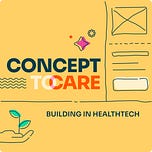Today on Concept to Care, we welcome Smita Nair, Chief Product and Technology Officer at Equip, a pioneering health tech company dedicated to treating eating disorders and related conditions such as anxiety, depression, and OCD. Equip offers virtual, family-based treatments accessible to patients of all ages across all 50 states, leveraging a comprehensive approach to ensure broad reach and effectiveness.
In this episode, we'll delve into the crucial role of clinical expertise in developing and scaling digital health solutions. Smita will share strategies for achieving impactful healthcare outcomes, focusing on aligning organizational tasks with broader company goals and the importance of tying every action to key organizational metrics.
We'll explore Smita's approach to product development and strategic roadmapping, including maintaining flexibility in plans while ensuring stakeholder alignment. She'll explain how to balance strategic planning with the need for agility, especially in the dynamic healthcare sector.
Additionally, Smita will discuss building high-performing teams, emphasizing clear role definitions, collective accountability, and fostering psychological safety. She'll offer advice on addressing cultural and operational misalignments with new hires and promoting a culture where feedback is seen as a tool for growth.
Some takeaways:
Clinical Expertise and Impact
Equip's Mission and Model: Equip is dedicated to treating eating disorders and co-occurring conditions like anxiety, depression, and OCD. They serve patients across all age groups with family-based treatment for children and teens, and individual treatment for adults. Equip operates virtually across all 50 states and is in-network with major commercial payers, covering approximately 110 million lives in the US. Equip’s comprehensive approach to treating eating disorders includes family-based treatment for children and teens, and individual treatment for adults. Their virtual model allows them to provide services nationwide, making them accessible to a large patient base.
Importance of Clinical Expertise: Smita values strong clinical expertise and outcome-focused approaches in digital health companies. She joined Equip because of its clinical-first approach, which she believes is crucial for effectively addressing healthcare problems and ensuring impactful technology solutions. Smita stresses that clinical expertise is foundational to developing effective healthcare solutions. Equip’s focus on clinical outcomes and expertise ensures that their technology is not just innovative but also impactful in improving patient care.
Feedback as a Growth Tool: Embracing feedback, even when it’s tough, is vital for growth. Smita views feedback as a gift that helps identify strengths and areas for improvement. She encourages openness to feedback and using it to drive personal and professional development. Smita encourages a culture where feedback is welcomed and used constructively. By viewing feedback as a tool for growth, individuals and teams can continuously improve and achieve better outcomes.
Organizational Strategy and Alignment
Understanding Organizational Metrics: Smita emphasizes that every task should be tied to an organizational-level metric. It may not always be a direct one-to-one relationship, but it's crucial to understand how it contributes to the overall goals. If a task or tech debt doesn't seem to relate, it's worth questioning its importance and possibly deferring it. Smita suggests that every team member should ask themselves how their work impacts the broader organizational metrics and goals. This helps in ensuring that all efforts are aligned with the company’s strategic objectives, thereby driving overall growth and efficiency.
OKRs and Alignment: Equip effectively uses OKRs (Objectives and Key Results) to drive alignment and accountability. Each department’s OKRs are derived from company-level OKRs, ensuring that all teams are working towards common business goals. Regular reviews and adaptations keep the focus sharp and aligned with changing priorities. Smita mentions that OKRs are reviewed rigorously every quarter, not just set at the beginning of the year and forgotten. This continuous review process helps in adapting to changes and maintaining a clear focus on what success looks like for each team and role.
Strategic and Tactical Balance: Smita highlights the importance of regular strategic check-ins, such as yearly and mid-year reviews, to ensure the roadmap remains relevant. Being responsive to market events and balancing operational priorities with strategic goals helps maintain focus and adaptability. Smita points out that while it’s essential to have a strategic vision, flexibility is key. The strategic roadmap should be adaptable based on new learnings, market events, and operational necessities. This approach helps in avoiding rigid plans that may not hold true in a dynamic business environment.
Team Building and Culture
Building High-Performing Teams: Clear roles and responsibilities, along with well-defined OKRs, are essential for high-performing teams. Smita fosters a culture of collective accountability, where the success of one team member contributes to the overall success of the team. She also emphasizes psychological safety, ensuring team members feel comfortable sharing concerns and feedback. Smita believes in making roles and responsibilities very clear to avoid distractions and confusion. She also stresses the importance of collective accountability, where the team’s success is prioritized over individual achievements, fostering a collaborative environment.
Dealing with Wrong Hires: Smita has faced situations where hires didn't align culturally or operationally. She believes in addressing such issues promptly with clear and kind communication. If alignment can’t be achieved, it’s better to part ways for the benefit of both the individual and the company. Smita shares that cultural misalignment is often the root cause of hiring issues. Addressing these issues transparently and promptly helps in minimizing negative impacts on the team and maintaining a healthy work environment.
Team Organization: Minimizing coordination burdens and ensuring clarity of responsibility are key principles in organizing teams. Early in Equip’s development, teams were organized around platform builds, but as the company scaled, teams were realigned to focus on business functions like clinical, commercial, and patient areas. Smita’s approach to team organization evolves with the company’s growth. Initially, teams were focused on building the platform, but as the company matured, the focus shifted to aligning teams with business functions to better meet strategic goals and enhance efficiency.
Recruitment and Talent Development: Smita looks for curiosity, hunger, and high agency in potential hires. She believes in leveraging networks to find the right people and emphasizes the importance of a good cultural fit. Building strong teams involves finding individuals who are eager to learn, grow, and contribute to the company’s mission. Smita values attributes like curiosity and a strong drive to excel. She believes that hiring individuals with these qualities, who also align with the company’s culture, creates a strong, cohesive team that can navigate challenges and drive innovation.
Product Development and Management
Focus on Outcomes: One of the key reasons Smita joined Equip was their focus on clinical outcomes. Even when the company was small, they were publishing outcomes and focusing on data transparency. This commitment to clinical expertise and outcomes aligned with Smita’s personal mission to make a positive impact in healthcare. Equip’s dedication to transparency and data-driven decision-making was a significant factor for Smita. She believes that a strong focus on outcomes ensures that the company is genuinely making a positive impact, which aligns with her personal goals in healthcare.
Roadmapping and Flexibility: Smita believes in a collaborative approach to roadmapping, ensuring alignment across different stakeholders. She stresses the importance of flexibility in roadmaps, understanding that plans may change based on new insights and priorities. Roadmaps should be directionally loose to allow for adjustments and iterations. Smita advocates for a flexible and inclusive roadmapping process. By involving various stakeholders and keeping the roadmap adaptable, the company can better respond to new information and changing priorities, ensuring continuous improvement and relevance.
Balancing Planning and Flexibility: While planning is essential, it’s crucial not to plan too far ahead. Smita advocates for a quarter-by-quarter approach, especially in the healthcare space, to remain agile and responsive to changes. This approach helps balance the need for stability in engineering processes with the flexibility to adapt to new priorities. Smita suggests that shorter planning cycles, such as quarterly plans, help maintain agility and responsiveness. This approach allows teams to quickly adapt to new priorities and changes, which is particularly important in the dynamic healthcare industry.
Agile Misconceptions: Agile doesn’t mean constant changes without structure. Smita clarifies that agile involves giving teams the necessary time to do their work correctly and iteratively, rather than planning everything in detail far in advance. Smita explains that agile methodology is about structured flexibility. It requires planning just enough to start and then iterating based on feedback and learnings. This ensures that teams have the time and space to develop solutions effectively without unnecessary disruptions.
Discovery and Iteration: At Equip, the discovery process begins with identifying the problem and desired outcomes. Understanding who the users are and conducting opportunity analysis from various perspectives is critical. Smita’s team emphasizes iterative delivery and learning, often starting with a minimum viable product (MVP) or even a pre-MVP version to gather feedback and make informed decisions. Smita highlights the importance of a thorough discovery process that involves identifying problems, understanding user needs, and analyzing opportunities. Starting with MVPs allows for quick learning and adaptation, ensuring that the final product effectively meets user needs.
Empathy and Lean Startup Methodology: Empathy is central to Smita’s approach, whether in product development or team interactions. Understanding the user’s perspective and focusing on solving their problems is key. She also follows lean startup principles, emphasizing iterative development and learning from small, incremental releases. Smita incorporates empathy and lean startup principles to ensure that products are user-centered and developed efficiently. By iterating in small steps and continually learning from user feedback, the team can build solutions that truly address user problems.
—
Where to find Smita Nair:
LinkedIn: https://www.linkedin.com/in/nairsmita/
—
Where to find Angela and Omar:
Angela Suthrave
Omar Mousa
—
Referenced:
Equip’s Company Website: https://equip.health/
Equip is hiring: https://equip.health/join-us#jobs
Equip was highlighted on Time100 as one of the most influential places to work: https://time.com/collection/time100-companies-2023/6285207/equip/
Equip was highlighted by Fast Company as one of the top most innovative companies of 2024: https://www.fastcompany.com/91040027/equip-most-innovative-companies-2024
Feedback is a gift, how to give and receive feedback: https://buffer.com/resources/how-to-give-receive-feedback-work/
Asana’s guide for creating company wide Objectives and Key Results (OKRs): https://asana.com/resources/setting-okrs
Pingboard’s — How to set up OKRs across departments: https://pingboard.com/blog/how-to-set-up-consistent-okrs-across-departments-okr-template/
Mind The Product’s — How to build high performing product management teams: https://www.mindtheproduct.com/how-do-you-build-a-successful-product-team/
A guide for helping candidates evaluate start-ups before they join the company: https://humaninterest.com/learn/articles/33-questions-help-evaluate-startup-job-offer/
How to build flexible product roadmaps: https://www.chameleon.io/blog/product-roadmaps
Smita’s favorite methodology — Lean Start-up Methodology: https://theleanstartup.com/principles
The importance of 1 on 1s — a comprehensive guide to 1 on 1 meetings: https://www.small-improvements.com/resources/1-on-1-meetings/
—
Check out our website: https://www.concepttocare.com
Follow us and Subscribe wherever you get your podcast:
















Share this post